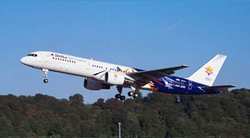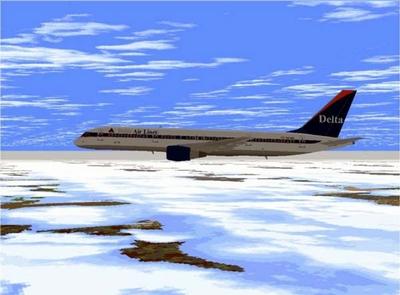Delta Airlines Battles Low-Cost Carriers By Putting On Its
Strong Suit
 Delta Airlines promises to fight
back as carriers like Southwest and AirTran start encroaching on
its traditional passenger base. The reason? To hear Delta CEO Leo
Mullins tell it, Delta just hasn't been that something special in
the air lately.
Delta Airlines promises to fight
back as carriers like Southwest and AirTran start encroaching on
its traditional passenger base. The reason? To hear Delta CEO Leo
Mullins tell it, Delta just hasn't been that something special in
the air lately.
"I think the customer experience in 2002 and even the early part
of 2003 was not as good as it should have been," Mullin said in a
recent interview with The Associated Press. "I have basically
decreed and said to everybody we've got to decree the survival
period is over and get back to what has made Delta great over the
years, which is a real concentration on customer service and that
is what we're about right now."
 Like most airlines, Delta changed
dramatically in the wake of the 2001 terror attacks on New York and
Washington. Delta was renowned for its commitment to customers
service, the smiling faces and shorter waiting periods. But after
laying off 16,000 people during one of the worst slumps the
industry has ever seen, Delta is a shadow of its former self.
Like most airlines, Delta changed
dramatically in the wake of the 2001 terror attacks on New York and
Washington. Delta was renowned for its commitment to customers
service, the smiling faces and shorter waiting periods. But after
laying off 16,000 people during one of the worst slumps the
industry has ever seen, Delta is a shadow of its former self.
"They've lost it, and customers noticed. Then AirTran pops up
with smiling friendly people and suddenly people had something to
compare Delta to in Atlanta, and that's why AirTran is where they
are today," says Terry Trippler, an industry expert with the
online travel service cheapseats.com.
Delta is, according to one industry watcher, by no means alone.
Other airlines, hard-hit by 9/11, are also cutting back customer
service at a time when just getting through security and on board
the aircraft is an adventure.
Delta, however, is trying to make up for the reduction in staff
by using technology. Like many airlines, Delta has installed
boarding pass kiosks at its ticket counters, allowing passengers
who are already booked to get their passes without standing in long
lines. Gateside devices are also being installed for those
passengers who miss their connecting flights, allowing them to
quickly get documents needed to board the next flight to their
destination.

"Yes, we've introduced technology into our airports, but we've
also changed our employee roles," said Rich Cordell, Senior Vice
President for Customer Service. But the bottom line is the customer
core of the airline industry, the business traveler. Ray Neidl, an
airline analyst with Blaylock & Partners in New York, says
Delta fares pretty well on that score. "If you lose the business
traveler, you'll never be able to get those yields back up," Neidl
said. "It's especially important for Delta to keep its service
reputation up."
It's hard, though, for employees to give 110-percent to the
customer service aspect of flying when they're constantly wondering
about their own futures. CEO Mullin says he's trying to reach out
to his employees.
"They've been battered a bit by the circumstances that have
occurred," Mullin said. "Who could not? It's been very hurtful to
lose 16,000 of your valued colleagues and have all of that change
your entire relationship. So we're working hard on the employee
morale situation in order to build that sense of spirit back into
the place as well."
 NTSB Prelim: Cirrus Design Corp SR20
NTSB Prelim: Cirrus Design Corp SR20 ANN's Daily Aero-Linx (11.30.25)
ANN's Daily Aero-Linx (11.30.25) ANN's Daily Aero-Term (11.30.25): Wind Shear Escape
ANN's Daily Aero-Term (11.30.25): Wind Shear Escape Aero-News: Quote of the Day (11.30.25)
Aero-News: Quote of the Day (11.30.25) Airborne 11.26.25: Bonanza-Baron Fini, Archer v LA NIMBYs, Gogo Loses$$$
Airborne 11.26.25: Bonanza-Baron Fini, Archer v LA NIMBYs, Gogo Loses$$$





